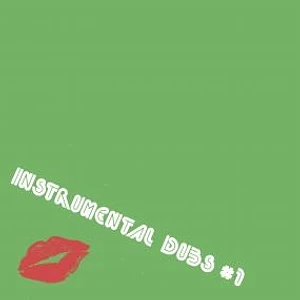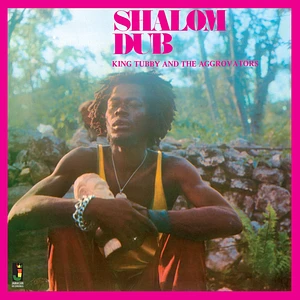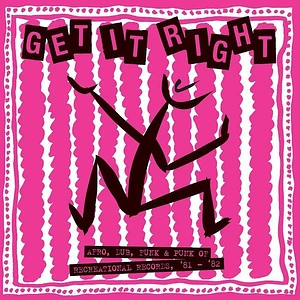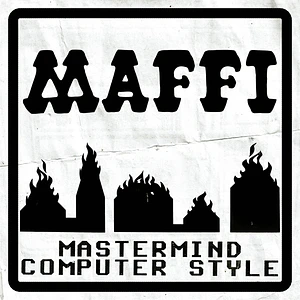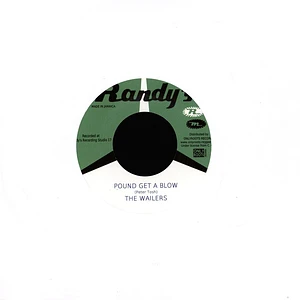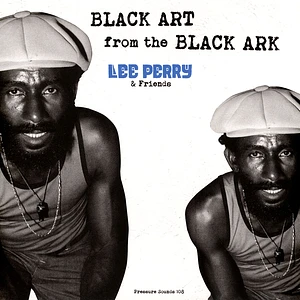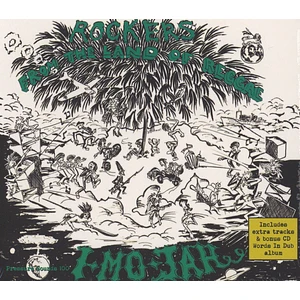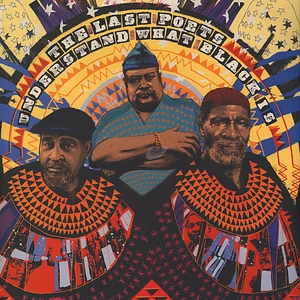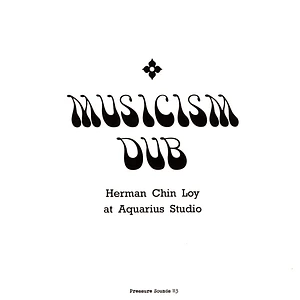A tumultuous selection of recordings from Black Ark, Perry's legendary studio and hotbed of creation. Rare 12" versions, unreleased mixes and featuring a stellar line-up, including:
Drums: Mikey ‘Boo’ Richards, Lowell ‘Sly’ Dunbar
Bass: Boris Gardiner, Radcliffe ‘Dougie’ Bryan
Guitar: Earl ‘Chinna’ Smith, Ernest Ranglin, Robert ‘Billy’ Johnson, Lynford ‘Hux’ Brown
Keyboards: Winston Wright, Robbie Lynn, Keith Sterling
Percussion: Noel ‘Scully’ Simms, Lee Perry
A quick internet search brings up some extraordinary footage of Lee ‘Scratch’ Perry producing a session at the Black Ark. Taken from the film ‘Roots, Rock, Reggae’, directed by Jeremy Marre, the sequence shows Junior Murvin collaborating with members of the Congos and the Heptones on a song improvised on the spot for the film crew. Before the vocals are recorded, the Upsetters lay down the backing track. The musical director of the session is the afro-haired bass player, Boris Gardiner; unusually, it is he who counts in the band to start each take. After a long conversation with Boris a few years back, I asked Lee about his contribution to the Black Ark sound.
Lee Perry: ‘Boris Gardiner was a good person, just a humble person, and he’s the best person I ever met in the music business so far. Boris is a very top musician, and with him you could put anything together, him do “Police And Thieves” and all that. You just tell him what you want and him can do it. A very great person.’
Boris is probably best remembered today for his huge international hit from 1986, the schmaltzy ‘I Want To Wake Up With You’. Yet in the 60s and 70s he was one of Jamaica’s top bass players and arrangers, having an international hit with ‘Elizabethan Reggae’, and creating a run of classic tunes at Studio One.
Boris Gardiner: ‘I did at least seventy or eighty songs at Studio One, all in this one short period between January and April 1968. And we used to work four days per week, and we did four rhythms per day for 30 pounds a week – it was good money. I played on songs like “Feel Like Jumping”, “Nanny Goat”, “Baby Why” by the Cables, the whole “Heptones On Top” album, and “Party Time”. Lee Perry used to be at Studio One same time as me, kind of working around, so he know me from there. So he came and roped me into the group when the Black Ark studio was in progress. He built it right there at the back of his home. So Scratch called me and asked me to come and do some sessions around his studio. I was always ahead of my time as I can see it, in the music in Jamaica. So the songs that I made you always hear chord progressions and changes. Sometimes I think it’s as if I was born in the wrong country, because I just couldn’t do a two chord tune – heheh! To me it need more than two chords to give it some excitement, like it need some changes or something.’
After years of moving between Jamaica’s competing facilities, Perry had decided to build his own studio at the back of his house in Washington Gardens.
Lee Perry: ‘The Black Ark make over a pile of shit – my pile and me put it under the Black Ark. I make the Black Ark over my shit piss, so the bass always go “Poo Poo Poo Poo”! Errol Thompson put the machines in there, and make the patch panel. So the studio was all waiting, but only me could operate it. I didn’t have the Soundcraft mixer then, I did buy a lickle thing you call a Alice mixer. We didn’t have anything professional, but the sound was in my head and I was going to get down what I hear in my head. And it’s like a toy, a toy affair, that’s the way music is. You see like when you buy a kid’s toy, well you bring a joy to them, so is that way I see music. I don’t see music like how other people see it, I see it just like a toy.’
Unusually, Lee decided to do everything himself, both producing and engineering. The film clip shows Lee fully relaxed as he simultaneously directs the musicians and adjusts his recording machines.
Boris Gardiner: ‘To me Scratch always knew what he wanted. Out of all of them Scratch was a true producer, because he would be in the studio and he would listen and say change this or I don’t like that, and he was his own engineer also, so he was always around there listening. So he knew what he wanted and how to try and get it from the start, unlike Coxsone Dodd or Duke Reid, who knew what they liked or didn’t like only after they heard it. Scratch was in there with everybody, so he is really doing a full production as a true producer.’
Lee Perry: ‘I used to do them all by myself. Anybody in my studio could sit down in the visitor’s chair and look, but me do everything – me have a chair that can move from here to there, a chair that have wheels. So I could be turning in any area or any direction, so I could have my hand over here and my hand over there. Heh heh.’
And at a time when 8 and 16 track recording had become the norm in most high end studios, Lee recorded everything to a semi-professional TEAC 4 track recorder, which he can be seen casually adjusting with a screwdriver in the film clip. He explained that since he would end up mixing down to a stereo (or two track) master, more tracks would just be a distraction.
Lee Perry: ‘It was not a professional tape recorder, I was using those TEAC 4 track set that they was trying like experiment to see what would happen. Well, I have it all set up. The first thing I’d think about, all right, is you have to mix everything back down to the 2 track stereo or 1 track mono. Then you can press it and release it. So I knew what I wanted at the end, and I balance it just like that in the studio with the instruments. Sometime when you put only four or five instrument in the studio, you have a better, cleaner record, you can hear what everybody play. And if you have maybe eight musician in the studio, it’s more like a confusion, because everybody wants to play a different thing, yunno. If you is the producer and you can tell them what you want to hear it will be better. So I can put the bass and drum together on one track because me know exactly what me need. If you don’t know, then you need more tracks so you can balance it later. So for the backing, I would just do the two tracks: the bass and drum and percussion track, that is one; and the guitar, organ and piano on another track, that is two. So you still have two more tracks if you want to do vocal, that would be three. And if you want to do horns or a harmony vocal, you can do that on the fourth track. To me it’s a waste of time, a waste of energy with a 24 track machine, waste of current and waste of money. Because it all have to come down to one or two tracks in the end.’
The early Black Ark sound was stripped down and minimal, often with only one or two musicians playing keyboard or guitar. Lee would also use extreme EQ to emphasize the bass and tops, and his hi-hat sound is instantly recognisable from the earliest days of the Ark.
Lee Perry: ‘Well, I used to have an equaliser for the bass drum, and it’s like for heaviness on the beat, and then I had another equaliser for the cymbal, to give it that “Ssshhh ssshhh”. So we have different machine to send different instrument through that they can sound different. I managed to change the vibration of the music, because the music was just local music produced by rum drinkers and cannibals. So me turn on the music to a higher range.’
Boris Gardiner: ‘I think I always use a DI box to record bass at the Black Ark. Because bass want to fade into the other instruments’ microphone, so we often plug it straight into the board and then Perry sets the EQ on the board and take it straight. Then we built a drum booth so the drums really sound separate too – it give him more control.’
As the Black Ark evolved, Lee developed a richer collage of sound, built around three primary effects: the Mu-tron Bi-Phase phaser, a spring reverb and a Roland Space Echo.
Boris Gardiner: ‘One thing about Scratch was that he always used his effects – that was his sound. He always phase the ska guitar, but you don’t always know he’s recording it like that until he play it back. So until he play it back you have no idea what it will sound like.’
Lee Perry: ‘I did have a phaser that I buy, and then when I’m in the studio, in the machine room, and phasing them, the musicians don’t hear it, what I am doing, until them come in the studio, and them hear the phasing. So we did it all live. And the musicians they won’t even know what goes on! While the musicians are playing, I am doing the phasing. I take the musician from the earth into space, and bring them back before they could realize, and put them back on the planet earth. The phaser was making things different, like giving you a vision of space and creating a different brain, a phasing brain. So that’s where I take the music out of the local system and take it into space. The Space Echo also have something to do with the brain. You send out telepathic message and it return to you, so that’s how the Roland Space Echo chamber come in – what you send comes back to you. And while you know you send the telegrams out, you are waiting for what is the reply of the telegrams coming back. So that’s why the Space Echo go and come, rewinding the brain and forward winding the brain. I was also using a spring echo chamber, but just for drum, for the clash of the drum. And everything just fit in, like the thing I want to do it just come to me and come from nowhere, and then it appear and it happen.’
Boris Gardiner: ‘He loved to do things that nobody had done before, him always try a new thing. And he was a good writer too you know. Perry bring in a drum machine sometimes and we use that on some songs for the Congos and everyone. Well I actually like playing with a drum machine cos a drum machine is always steady. Most drummers they either push forward or pull back – they call it the human touch, but I call it out of time! Hahaha. “Row Fisherman Row” was really the great hit with the Congos, but that is all real drums and percussion, it’s just that Perry makes it sound almost like a machine with his echoes on the percussion. I played on “Police and Thieves” and that was a big hit too, maybe it was Sly Dunbar on that. One day Bob Marley came to him with a song on a tape and said “boy Perry, I don’t really like the bass and drum on this song here, if you can do anything to it then just change it and see if we can get something better”. Well Perry had only 4 track tape at his studio, but this was a 24 track tape that Bob bring. So Perry called me and Mikey Boo and took us down to Joe Gibbs studio and started playing the rhythm and all that on the 24 track. So I was on bass and Mikey Boo was on drums and we listen and we listen, and then we dub it back over to make new drum and bass. Well that song became “Punky Reggae Party”, so that shows you how Bob trusted Perry.’
Lee’s other great innovation was adding layers of sound effects, sometimes live through an open mic, but often pre-recorded onto a cassette tape which he would add to the collage on mixdown. Because these effects – bells, cymbals, animal noises, dialogue from the TV – were not synched to the music, they would add a layer of randomness to the sound.
Lee Perry: ‘You know cassette? I make cassette with sound track, and all those things with cymbal licking, flashing. In my Black Ark studio if you listen the cymbal was high, like “Ssshhh ssshhh”. But I did have them all recording on cassette, and while I was running the track and it was taking the musician from the studio, I was playing the cassette to balance with the drum cymbals and things like that, so them didn’t have to play that because it was already on cassette playing. You could call that sampling. And I have this “Mooooow”, like the cow, running on the cassette, and it go onto the track that I wanted to sound like that. Somebody discover it in a toilet. You know when the toilet paper is finished, and you have the roll, and the hole that come in the middle. Well you put it to your mouth and say “Hoooooo”, and it sound like a cow. You put it to your mouth and you imitating a cow and say “Moooooo”. Heh heh heh. Yeah, sound sampling. Well somebody had to start it, and we was loving to do those things.’
Boris Gardiner: ‘Well the Black Ark did have a strong vibe, but, once everybody all there, most of those guys who smoke really like it, but those who didn’t smoke didn’t really like it, like myself. Scratch is a man who never joke fi draw him herbs, you know? Heheh. But I am not a smoker cos it’s not good for my heart. I have a heart problem called tachycardia, an irregular beat of the heart. So it could be upsetting at times when there’s so much smoking going on.’
By the late 70s the relaxed atmosphere at the Black Ark had soured, as Lee attempted to extricate himself from various outside pressures, and his behaviour became more erratic.
Lee Perry: ‘What happened I did for myself not to be working with jinx and duppy called dread. And those duppies they think that me owe them favour. I open the door, and the duppies them find that me is the door opener, and then the duppies them take shape inna me yard and inna me house, and they were a jinx. Jinx mean bad luck. So to get rid of them, me had to burn down the Black Ark studio fi get rid of jinx.’
Boris Gardiner: ‘Was Scratch crazy? Well some say now that he was just putting on an act. But I think, why did he put it on? After all the problems he was having and that sort of thing, and they were saying that he was getting off his head, and he start to act strange, well I just stopped going. I stopped working there. It wasn’t a good atmosphere – nobody could really enjoy that again. So I called it a day. It is sad after all the good work we did. But when you try to be smart and try to outsmart others, well it don’t work out for long with you. He came and did a show here in Jamaica the other day, but I didn’t really know Lee Perry as a singer. He won the Grammy not long ago, but I find it surprising that he got a Grammy as a performer not a producer. He’s been very lucky: now he is successful in a sense and some people love him cos he’s a character, and they don’t see nobody dressed like that. Hahahah!’
Speaking to Lee in February 2021, via WhatsApp to Jamaica, he sounded relaxed and positive, with more praise for Boris and optimism for the future.
Lee Perry: ‘Boris Gardiner was very good, very great in the brain. He really intelligent in music, and me and him work miracle together! And remember that there was no end to the Black Ark, the Black Ark will be coming back. The Black Ark keep on living and cannot die.’
